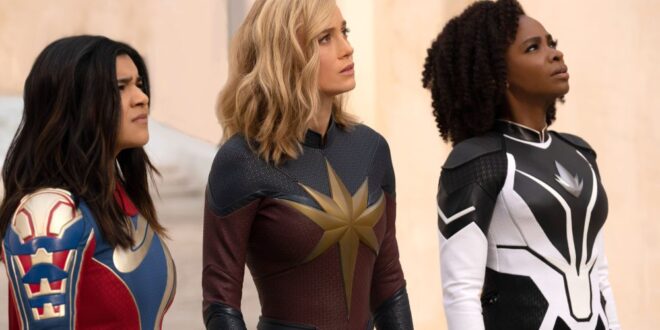Disney’s Marvel Cinematic Universe is no longer a bulletproof box office franchise.
That much is clear after “The Marvels” misfired with $47 million in its opening weekend to land the worst debut in MCU history. Initial tracking was closer to $75 million to $80 million, but those projections shrank dramatically in recent weeks to $60 million to $65 million. With bad buzz and actors like Brie Larson unable to promote the film due to the SAG strike (which finally ended on Friday), “The Marvels” didn’t even match those disappointing estimates.
Only two other films in the sprawling series (“The Marvels” is the 33rd installment in 15 years) have opened to lower than $60 million: 2008’s “The Incredible Hulk” with $55.4 million and 2015’s “Ant-Man” with $57.2 million, not adjusted for inflation. Although the MCU has been showing rare signs of wear and tear in its Spandex, the franchise’s other two big-screen adventures to open this year, February’s “Ant-Man and the Wasp: Quantumania” ($106 million) and May’s “Guardians of the Galaxy Vol. 3” ($118 million), still managed to hit triple digits in their respective debuts. The third “Ant-Man” wasn’t labeled a bust until the end of its box office run. “The Marvels” is the rare MCU movie to flop out of the gate.
“The Marvels” also fell short of expectations at the international box office with $63.3 million from 51 territories for a worldwide start of $110 million. Disney had hoped to generate at least $140 million globally over the weekend. And even that wouldn’t have been great for a tentpole that cost roughly $220 million to produce and $100 million to promote the film to audiences across the globe.
“The Marvels” turnout (or lack thereof) is surprising because the passionate MCU fanbase has turned even less-embraced installments into box-office winners. Audiences flat-out rejected “The Marvels,” so it’ll likely struggle to rebound as the holiday season heats up with “The Hunger Games” prequel “The Ballad of Songbirds and Snakes,” Disney’s animated “Wish” and other family-friendly films in the coming weeks.
“This is an unprecedented Marvel box office collapse,” says David A. Gross, who runs the movie consulting firm Franchise Entertainment Research. “The strikes hurt the film’s marketing, but that’s not what’s driving these numbers.”
“The Marvels,” directed by Nia DaCosta and co-starring Larson, Teyonah Parris and Iman Vellani, is the sequel to 2019’s billion-dollar blockbuster “Captain Marvel.” The follow-up film didn’t come anywhere close to the heroic $153 million debut of its predecessor, However, “Captain Marvel” was advantageously released between two of the biggest movies of all time, 2018’s “Avengers: Infinity War” and 2019’s “Avengers: Endgame,” which made it appointment viewing for comic book fans.
At that time, Marvel could do no wrong at the box office, delivering a billion-dollar behemoth with the casual snap of Thanos’ fingers. It was always going to be tough (or next to impossible) to top the cultural force of “Endgame,” but attendance for some of the films in its wake have been startlingly Earth-bound. This comes as Disney has introduced countless new characters in spinoffs, sequels and TV series that have graced the big and small screen. For casual viewers and Marvel devotees alike, it’s a lot to keep up with.
“Since the pandemic, superhero films have endured simultaneous streaming, unimaginative and bad movies [and] saturation on TV,” Gross adds.
Does this mean that superhero fatigue has plagued society, once and for all? Not necessarily. But the disastrous turnout for “The Marvels” could force a reckoning at Disney now that it’s clear that audiences aren’t willing to see any ol’ superhero movie on the big screen. Earlier this week, the company postponed the next four MCU installments, “Deadpool 3,” “Captain America: A Brave New World,” “Thunderbolts” and “Blade” (because of strike-related production delays), which gives the studio time to tinker with its strategy before Earth’s Mightiest Heroes return to the multiplex.
“Marvel has historically seen most of its films benefit from goodwill. The opposite of that momentum is currently playing out right now,” says Shawn Robbins, the chief analyst at Boxoffice Pro. “It’s a crucial time now for Disney to allow Kevin Feige and the Marvel brain trust as much creative control as possible to course correct.”
“The Marvels” was this weekend’s only new nationwide release, so several holdovers rounded out box office charts. “Five Nights at Freddy’s” dropped to second place with $9 million from 3,694 theaters in its third weekend of release. Universal and Blumhouse’s terrifying video game adaptation has been a bright spot this time of year, generating a scary-good $127 million in North America and $215 million worldwide to date.
In third place, Taylor Swift’s “The Eras Tour” added another $5.9 million from 2,484 venues in its fifth weekend of release. The concert film, produced by Swift and distributed by AMC Theatres, has grossed $172.5 million in North America and $240.9 million globally. At the domestic box office, “The Eras Tour” has outperformed tentpoles like “Mission: Impossible – Dead Reckoning Part One” ($172 million) and “Transformers: Rise of the Beasts” ($157 million). It’ll soon overtake “Indiana Jones and the Dial of Destiny” ($174 million) as the 11th-biggest movie of the year.
Sofia Coppola’s Priscilla Presley biopic “Priscilla” remained in fourth with $4.79 million from 2,361 theaters, a barely-there 10% decline from the prior weekend. It’s an impressive hold for the A24 movie, which has generated $12.7 million so far. The awards season hopeful, which takes a very different lens than Baz Luhrmann’s 2022 kaleidoscopic biopic “Elvis,” will continue to expand through the fall.
Martin Scorsese’s “Killers of the Flower Moon” landed at No. 5 with $4.6 million from 3,357 locations in its fourth frame. Ticket sales for the $200 million crime epic, starring Leonardo DiCaprio and Robert De Niro, also stayed strong with a 34% drop.
So far, “Killers of the Flower Moon” has grossed $59.9 million domestically and $137 million worldwide. It’s been complicated to assess whether this result is successful or terrible for such an expensive film because Apple, which backed the big-budget tentpole and hired Paramount to put it in theaters, doesn’t have the same metrics of success compared to traditional Hollywood players. It’s banking on Oscars attention and added Apple TV+ subscribers to help validate the price tag.
This fall has been a trying time at the box office. Without famous faces to promote their buzzy projects, it’s been a near-constant state of release date delays or disappointing grosses. Now that the historic writers and actors’ strikes have been resolved, Hollywood and exhibitors are hoping that business will pick up around the holiday season.
“This weekend captures the industry’s fatigue. What should be a powerful Marvel sequel is going to pass quietly, with little energy or excitement,” Gross says. “It’s going to take time to rebuild.”



